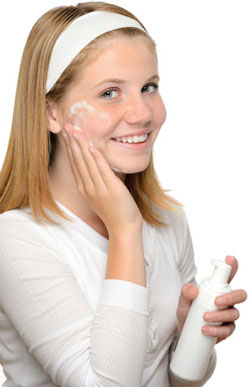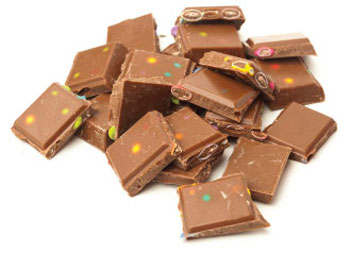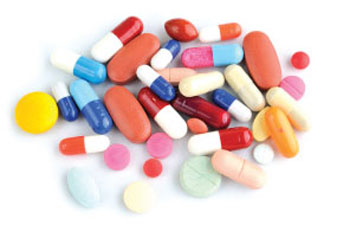The world is a teenager’s oyster. The teenage years are jam-packed with fun, friendship, sports, freedom, change, growth, and promise. Well, unless said teenager has skin conditions like acne, eczema or psoriasis that are causes emotional pain or embarrassment.
Skin conditions do not just affect a teenager’s appearance.
The teenage years are the time of life when first dates, first kisses, homecoming queens, and proms all occur – the success of which more often than not is dependent on one’s perceived level of physical attraction. However, skin conditions can affect teenagers on a much deeper level. Face it: kids can be mean! The teenage years are also where “mean girls” and bullies rise up and use cruelty, intimidation, and emotional or physical abuse to assert dominance over those they deem “losers,” “freaks,” “nerds,” or “uncool.” While those with perfect skin are not always exempt from bullying and cattiness, teenagers with visible skin conditions are often targeted.
Whether a teenager is motivated by the pursuit of beauty or sheer avoidance of pain and humiliation, he or she is likely to follow some form of skin care regimen. Sometimes that involves using nationally advertised skin care products; other times, it involves seeking the services of an aesthetician or physician.
While there are several products, therapies, and medications that effectively improve the appearance of a skin condition, not all of them are ideal due to their possible short-term and long-term side effects. Because of these concerns, a holistic skin care regimen can be best for teenagers.
There is some confusion and misinformation regarding what holistic skin care actually entails – some believe it is just all-natural or organic products and non-invasive treatment; others believe it only has to do with nutrition and nothing else. My definition of holistic skin care is: Treating the skin from the inside out and outside in, using nutrition and healthy lifestyle choices, in addition to high-quality, natural products that nourish and protect the skin.
 Natural Products
Natural Products
There seems to be a division of beliefs in aesthetics. There are those held by the medical aestheticians and those held by the holistic aestheticians. I have trained and worked in both modalities, and ultimately, I chose the holistic route because I felt it offered more long-term benefits with fewer unpleasant side effects. I also noticed that, with a holistic approach, my clients experienced other health benefits besides better skin – they experienced more energy, a more positive outlook, improved digestion, and weight loss, among other things.
In my work as a holistic skin care and health writer, I have learned that many of the ingredients in chemically-based products can lead to skin allergies, skin irritation, inflammation, and dehydration. Each of these responses is associated with negative effects on different organs and systems of the body such as brain, central nervous system tissue, and hormones.
The purpose of this article is not to debate controversial ingredients, however, experts on the medical and holistic side agree that certain skin conditions are linked to escalated hormonal activity and imbalance, both occurring during teenage years.
It is a fact that certain chemicals in conventional skin care products are known xenoestrogens. Xenoestrogens are man-made chemical compounds which mimic the effect of estrogen in the human body. These differ from phytoestrogens which occur naturally in many plant foods…they are found in conventionally grown foods, skin care and personal care products (in the form of pesticides, herbicides, insecticides, food additives, preservatives, synthetic fragrances and perfumes, chemical sunscreens), pharmaceutical drugs (birth control pills, certain antibiotics and steroids), plastics (food storage containers, water bottles, product containers), and household cleaning products, just to name a few. Xenoestrogens affect the body in many ways including:
- Increased mood swings
- Increased stress
- Increased mental health issues, such as depression and anxiety
- Increased cravings for sugar, alcohol, and other substances
- Decreased attention span
- Disrupted sleep, insomnia, and chronic fatigue
Many teenagers already experience these symptoms without the addition of chemically-based skin care products. These symptoms (especially stress, disturbed sleep, and sugar cravings) are all known to interfere with the body’s ability to heal from breakouts and flare-ups. Choosing products for the skin, body, and household, formulated without xenoestrogens, likely will not solve every parent’s hormone-related teenage issue, but it certainly can help.
While aestheticians cannot always control what products are used and sold in their places of employment, they can make recommendations to their
managers and spa owners to at least carry one natural product line.
How Diet Affects the Skin
It is not an aesthetician’s responsibility to make specific dietary recommendations. However, certain general recommendations can be made, or the aesthetician can refer the client and his or her parents to a holistic nutrition professional.
Evidence supports the idea that certain foods and nutrients might improve the skin, while others might make it worse. We are all familiar with the myth that eating too much chocolate causes acne. It is not the actual chocolate (cacao) that is the problem. It is the milk, sugar, and unhealthy fats added to the cacao to make it sweeter and improve consistency that causes the problem.
Milk and other dairy products have long been touted by the United States Department of Agriculture (USDA) and the Food and Drug Administration (FDA) as healthy foods – it is even its own food group. It has always been marketed to kids and parents as a necessary source of calcium and other minerals for good bone health. And while milk may be good for bone health, when it comes to skin health, unfortunately, that is not always the case.
“The famous Nurse’s Health Study examining health habits of 47,000 nurses found that those who drank more milk as teenagers had much higher rates of severe acne than those who had little or no milk as teenagers.”
In addition, “a three-year prospective study of nine to 15-year-old girls found a 20 percent increase in acne prevalence in girls who had two or more servings of milk per day compared to less than one per week.” This association held true for total, whole, low fat, and skim milk. The same researchers found a similar association in boys who drank skim milk (milk highest in protein).
 Refined sugar contributes to skin conditions in many ways:
Refined sugar contributes to skin conditions in many ways:
- Raising acidity in the body
- Disrupting the balance of healthy versus harmful bacteria and yeasts in the digestive tract, causing overgrowth of Candida and other microorganisms
- Contributing to insulin resistance
- Raising levels of sex hormones and growth factors
Unhealthy fats also contribute to skin conditions, as well as many chronic health conditions (which, unfortunately, are more prevalent in the pediatric and adolescent population than ever before). The high amounts of processed food found in the American food supply are full of inflammatory fats – saturated fats, trans-fats, excessive levels of omega-6 – and processed vegetable oils. These increase insulin-like growth factor 1 (IGF-1), cause inflammation, and stimulate pimple follicles.4
However, healthy essential fatty acids (EFAs), such as omega-3 fats (from fish oil and certain nuts and seeds) are known to reduce inflammation, nourish and protect the skin at the cellular level and may improve acne and other skin conditions.
Nutritional deficiencies of vitamins A, E, zinc, and others are also linked to skin disorders. While processed convenience foods and popular teenage foods like pizza might be high in calories and carbohydrates, they are low in actual vitamins and minerals that are only found in fresh fruits, vegetables, and properly prepared whole grains.
The relationship between diet and skin is one that has been studied quite frequently in recent research – especially in teenagers. In fact, one recent study on teenagers with acne revealed that acne was, related to high consumption of unhealthy fats and sugar from junk and fast foods.
Certain skin conditions are linked to escalated hormonal activity and imbalance, both occurring during teenage years.
How Lifestyle Affects Teenage Skin
Lifestyle factors including stress, lack of sleep, substance use, insufficient exercise, and poor hygiene are known to negatively affect the skin. These factors certainly affect adults, but because of the dramatic and rapid changes that happen during teenage years, their effects on teenagers and teenage skin are quite significant.
Holistic practices such as meditation and mindfulness (yoga, deep breathing, and so on) are very helpful in managing stress and calming teenage emotions – both of which can have a positive effect on the skin. Additionally, mundane practices such as proper hygiene, fitness regimens, and adequate hydration are equally important. Bathing regularly, wearing clean clothes, avoiding touching the face and picking at skin, changing washcloths, towels, pillowcases, and sheets often are small, simple changes that can also make a big impact. Exercise is not just important for overall health and mental and physical fitness, it is also important for healthy skin because it increases blood circulation and helps the body detoxify through lymphatic stimulation and perspiration.
Adequate hydration inside and out is also crucial for healthy skin. When we drink water, it first goes to hydrate the vital internal organs. By the time it reaches the skin, there is not much left! Most people do not drink enough pure water, thinking that other beverages perform the same function which is not true. Broken out or otherwise compromised skin also is more prone to transepidermal water loss (TEWL), so hydrating on the outside with a hydrating spray toner and moisturizer is important to prevent dehydration and also reactive overproduction of sebum. Medical intervention should be the last resort.
 Antibiotics, steroids, oral contraceptives, and retinoids are effective treatments for acne and other inflammatory skin conditions, however, the side effects can be serious and long-term. Pharmaceutical companies now market directly to consumers, so your clients are likely to be familiar with these medications. Aestheticians and holistic practitioners cannot interfere with a physician’s orders; but, it is okay to encourage your clients to discuss their treatment options in depth because these are serious drugs with serious side effects. For example, Tretinoin (Accutane) is a chemotherapy drug that is used to treat severe acne and is linked to severe short-term and long-term side effects. These drugs are hazardous for adults, but they may be even more so for growing teenage bodies and minds with elevated hormone levels.
Antibiotics, steroids, oral contraceptives, and retinoids are effective treatments for acne and other inflammatory skin conditions, however, the side effects can be serious and long-term. Pharmaceutical companies now market directly to consumers, so your clients are likely to be familiar with these medications. Aestheticians and holistic practitioners cannot interfere with a physician’s orders; but, it is okay to encourage your clients to discuss their treatment options in depth because these are serious drugs with serious side effects. For example, Tretinoin (Accutane) is a chemotherapy drug that is used to treat severe acne and is linked to severe short-term and long-term side effects. These drugs are hazardous for adults, but they may be even more so for growing teenage bodies and minds with elevated hormone levels.
There may be safer treatment options for your clients to consider, and many of those options exist within the spa environment. Aestheticians are in the unique position where clients confide in us and trust us; we also have the opportunity to educate and make beneficial referrals. Because of this position, we have the opportunity to make a significant difference in a teenager’s skin and his or her quality of life.
 Rachael Pontillo is an award-winning AADP board certified Holistic Health Practitioner, licensed aesthetician, published author, and public speaker. She is the author of the new book Love Your Skin, Love Yourself and currently works in private practice as a health and image coach. Pontillo is the founder and author of the popular website and blog Holistically Haute™ and is also a featured writer in several leading health and beauty publications. Pontillo also holds a position as skin care expert and speaker for NeoCell™.
Rachael Pontillo is an award-winning AADP board certified Holistic Health Practitioner, licensed aesthetician, published author, and public speaker. She is the author of the new book Love Your Skin, Love Yourself and currently works in private practice as a health and image coach. Pontillo is the founder and author of the popular website and blog Holistically Haute™ and is also a featured writer in several leading health and beauty publications. Pontillo also holds a position as skin care expert and speaker for NeoCell™.
Want to read more?
Subscribe to one of our monthly plans to continue reading this article.